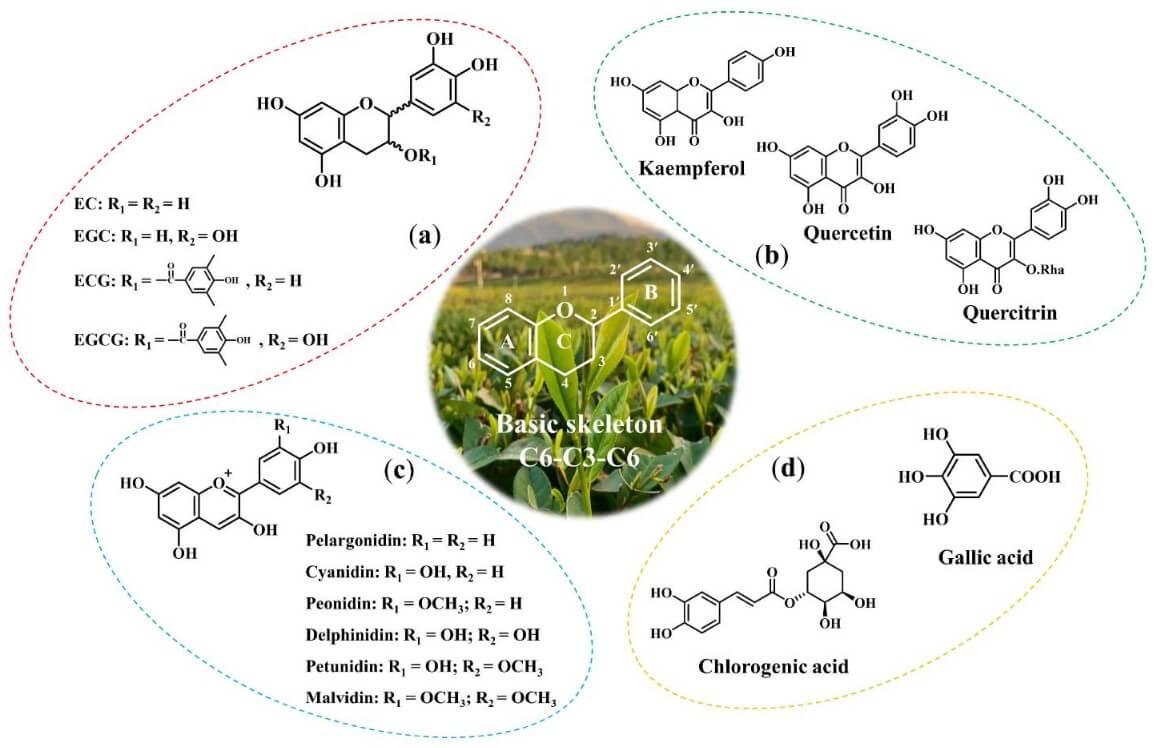We use cookies to understand how you use our site and to improve the overall user experience. This includes personalizing content and advertising. Read our Privacy Policy
Tea polyphenols, caffeine, lipopolysaccharides, etc., are components that have health and medicinal effects on the human body and are called components with medicinal value. The content of polyphenols in fresh tea is generally 18% to 36% (dry weight), which has strong anti-inflammatory, antioxidant, anti-mutagenic, and other physiological properties. Many animal and clinical studies have shown that tea polyphenols play a crucial role in preventing cardiovascular disease, cancer, obesity, diabetes, and allergic diseases. In addition, tea polyphenols, as the major secondary metabolites in tea, are physiological markers for judging the quality of tea leaves. Accurate analytical techniques are essential for in-depth analysis of the physiological activities of tea polyphenols and their exploitation.
 Fig.1. Structures of main polyphenols in tea. (Sun MF et al, 2022)
Fig.1. Structures of main polyphenols in tea. (Sun MF et al, 2022)
For a particular tea, although the various nutrients are basically the same, the content varies from time to time, from place to place, and from grade to grade. In addition, the processing process of tea determines the content of bioactive ingredients. These bioactive components have significant physiological functions such as lipid-lowering and weight loss, anti-lipid peroxidation, anti-aging, and cancer prevention. As a recognized leader in tea testing, Lifeasible can help you develop the best tea unique nutrients testing solution to detect flavonoids, polyphenols, catechins, alkaloids, caffeine, theaflavins, etc.
We aim to analyze the nutrient contents of various tea and evaluate their nutritional value, providing a scientific basis for further processing and utilization of tea. We work closely with our team of experienced scientists to find simple and reliable analytical solutions for the detection of unique nutrients in tea. We focus on testing the unique nutrients of tea according to national standards, including but not limited to:
| Unique Nutrients Testing Items in Tea | Main Representative Elements | Testing Methods |
| Tea Polyphenol Testing | Catechins (including epicatechin, epigallocatechin, epigallocatechin gallate, and epigallocatechin gallate), flavonols, anthocyanins, and condensed phenolic acids, of which catechins are important and specific to tea polyphenols. |
|
| Alkaloids Testing | Caffeine, theobromine, theophylline. |
Tea is a complex substance consisting of many components and has been extensively studied by our experts. Based on HPLC techniques, we can determine a wide range of unique nutrients in different types of tea (green tea, black tea, oolong tea, pu-erh tea) to assess their quality and to help control and manage their growth, processing, and storage conditions. Our efficient customer-focused service will guarantee the quality of your results and save you time and money. If you are interested in our solutions, please contact us for technical consultation and quotation.
Reference
Get Latest Lifeasible News and Updates Directly to Your Inbox
Mechanisms Regulating Plant Chloroplast Biogenesis
April 15, 2025
We use cookies to understand how you use our site and to improve the overall user experience. This includes personalizing content and advertising. Read our Privacy Policy